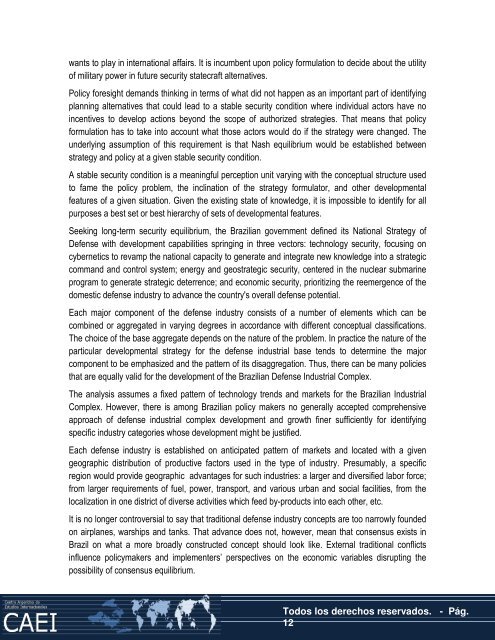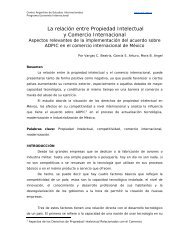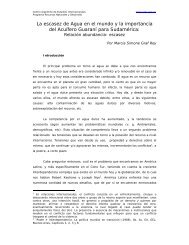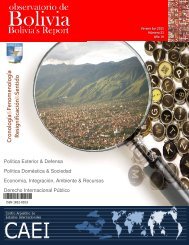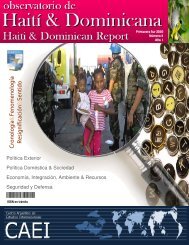Brazil's Defense Industry: The Emerging Transformational ... - CAEI
Brazil's Defense Industry: The Emerging Transformational ... - CAEI
Brazil's Defense Industry: The Emerging Transformational ... - CAEI
You also want an ePaper? Increase the reach of your titles
YUMPU automatically turns print PDFs into web optimized ePapers that Google loves.
wants to play in international affairs. It is incumbent upon policy formulation to decide about the utility<br />
of military power in future security statecraft alternatives.<br />
Policy foresight demands thinking in terms of what did not happen as an important part of identifying<br />
planning alternatives that could lead to a stable security condition where individual actors have no<br />
incentives to develop actions beyond the scope of authorized strategies. That means that policy<br />
formulation has to take into account what those actors would do if the strategy were changed. <strong>The</strong><br />
underlying assumption of this requirement is that Nash equilibrium would be established between<br />
strategy and policy at a given stable security condition.<br />
A stable security condition is a meaningful perception unit varying with the conceptual structure used<br />
to fame the policy problem, the inclination of the strategy formulator, and other developmental<br />
features of a given situation. Given the existing state of knowledge, it is impossible to identify for all<br />
purposes a best set or best hierarchy of sets of developmental features.<br />
Seeking long-term security equilibrium, the Brazilian government defined its National Strategy of<br />
<strong>Defense</strong> with development capabilities springing in three vectors: technology security, focusing on<br />
cybernetics to revamp the national capacity to generate and integrate new knowledge into a strategic<br />
command and control system; energy and geostrategic security, centered in the nuclear submarine<br />
program to generate strategic deterrence; and economic security, prioritizing the reemergence of the<br />
domestic defense industry to advance the country's overall defense potential.<br />
Each major component of the defense industry consists of a number of elements which can be<br />
combined or aggregated in varying degrees in accordance with different conceptual classifications.<br />
<strong>The</strong> choice of the base aggregate depends on the nature of the problem. In practice the nature of the<br />
particular developmental strategy for the defense industrial base tends to determine the major<br />
component to be emphasized and the pattern of its disaggregation. Thus, there can be many policies<br />
that are equally valid for the development of the Brazilian <strong>Defense</strong> Industrial Complex.<br />
<strong>The</strong> analysis assumes a fixed pattern of technology trends and markets for the Brazilian Industrial<br />
Complex. However, there is among Brazilian policy makers no generally accepted comprehensive<br />
approach of defense industrial complex development and growth finer sufficiently for identifying<br />
specific industry categories whose development might be justified.<br />
Each defense industry is established on anticipated pattern of markets and located with a given<br />
geographic distribution of productive factors used in the type of industry. Presumably, a specific<br />
region would provide geographic advantages for such industries: a larger and diversified labor force;<br />
from larger requirements of fuel, power, transport, and various urban and social facilities, from the<br />
localization in one district of diverse activities which feed by-products into each other, etc.<br />
It is no longer controversial to say that traditional defense industry concepts are too narrowly founded<br />
on airplanes, warships and tanks. That advance does not, however, mean that consensus exists in<br />
Brazil on what a more broadly constructed concept should look like. External traditional conflicts<br />
influence policymakers and implementers’ perspectives on the economic variables disrupting the<br />
possibility of consensus equilibrium.<br />
12<br />
Todos los derechos reservados. - Pág.<br />
12


